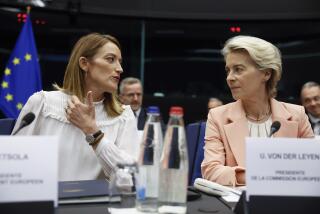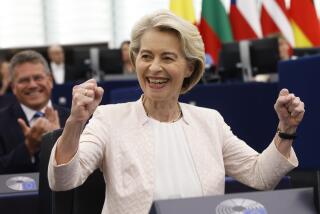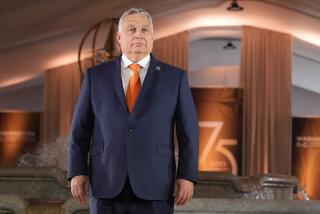European Union Officials Get Assignments : Diplomacy: Some observers see a weakened global role in decision by new head of Executive Commission to divide external relations portfolio.
BRUSSELS — The incoming head of the European Union’s powerful Executive Commission distributed portfolios Saturday to his team of 21 commissioners, who will chart much of the EC’s future over the next five years.
In the most controversial move, Commission President-designate Jacques Santer decided to split the responsibility for the EU’s external relations among four commissioners, a decision that some observers fear could weaken the EU’s effectiveness internationally.
The new commission is scheduled to begin work in January.
Santer’s choices effectively stripped Leon Brittan, one of the EU’s most effective and best-known figures, of crucial foreign affairs responsibilities.
Brittan, who gained prominence late last year as the EU’s chief negotiator during the final, hectic days of global trade talks, retained his job as head of trade relations with the United States, Japan and the industrialized nations of the Pacific Rim but was relieved of the key task of developing ties with Central and Eastern Europe.
In a statement after Saturday’s meeting, a clearly upset Brittan said he was “considering the position that has arisen.” His comment fueled speculation that he was contemplating resigning.
Expanding ties with the new democracies of Central and Eastern Europe and preparing at least some of them to become members of the union by the end of the century have become one of the EU’s highest priorities. Many believe that the region’s long-term stability is at stake.
Saturday, this task passed to Hans van den Broek, the former Dutch foreign minister who has been in charge of the EU’s external political affairs for two years.
Van den Broek led negotiations earlier this year with Austria, Finland, Sweden and Norway to become members of the EU in January. The Austrian and Finnish electorates have ratified the terms of those negotiations, while referendums are scheduled next month in Sweden and Norway.
In addition to Van den Broek and Brittan, Spain’s Manuel Marin and Portugal’s Joao de Deus Pinheiro will complete the EU’s foreign affairs team, sharing responsibilities for relations with the Third World.
Santer, outgoing prime minister of Luxembourg, summoned the new commissioners to a secluded chateau in his homeland to tell them who got the prime positions.
Backed by a bureaucracy of about 15,000 civil servants, the commission is the major instigator of Europe-wide legislation and supervises the EU’s $80-billion annual budget.
Under the 10-year reign of its current president, Jacques Delors, the commission has been the driving force behind the creation of the world’s single richest consumer market. It is now working to implement the terms of the 1991 Maastricht Treaty, which calls for far closer integration of the member states and sets a target of full monetary and political union.
Among the other important portfolios assigned Saturday, two respected technocrats, Yves-Thibault de Silguy, a senior French government official, and Italian economist Mario Monti, were given jobs that include the task of working for a single European currency by the end of the decade.
Former French Prime Minister Edith Cresson was given the research portfolio, while Britain’s former Labor Party leader, Neil Kinnock, was placed in charge of transportation policy.
More to Read
Sign up for Essential California
The most important California stories and recommendations in your inbox every morning.
You may occasionally receive promotional content from the Los Angeles Times.










